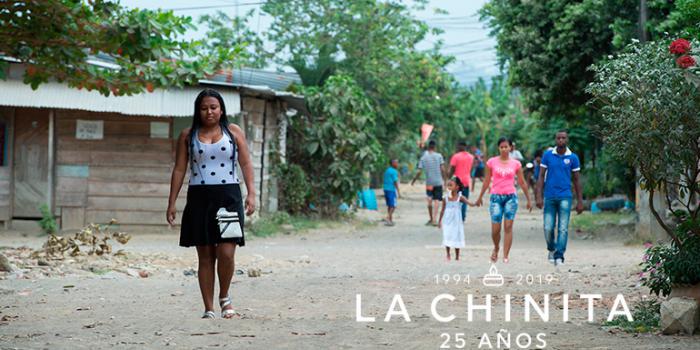
The Chinita Grew
After 25 years of the massacre of La Chinita, in Apartadó, occurred in January 1994, this community has made progress in the reconstruction of the social network and in the consolidation of new scenarios and inclusive opportunities through the Collective Reparation Plan. Among the commemorative activities scheduled for this Wednesday, highlight the conversation "La Chinita 25 years later, January 23, 1994-2019" and the delivery to the community of the park "Path of Collective Repair."

Every January 23 in the subject of collective reparation La Chinita, different activities are organized with which they seek to honor the memory of 35 victims that left this unfortunate event, which occurred 25 years ago, commemoration that will take place in the Obrero neighborhood, which will include a discussion about the progress of the process and the completion and delivery of the community infrastructure of the "SENDERO DE LA REPARACION COLLECTIVA" park.
The director of the Unit for comprehensive attention and reparation to the victims, Ramon Rodriguez, said that more than 300 million pesos have been invested for the reparation of the victims, as well as the importance of commemorating this massacre. an opportunity to work with the victims in a whole process of reparation, guarantees of non-repetition, to reach the community and be able to respond to it in each of the phases of Law 1448. "
This commemoration has been transformed, thanks to the joint work of this group for the fulfillment of the plan of collective reparation, which, with the accompaniment of the Unit, has reached an execution of 52.6% in the 19 measures of collective reparation, including the accompaniment of this commemoration during three consecutive years, which culminated in 2017, enough to allow the empowerment of the community who decide how they will honor the memory of the victims.
In the implementation of this plan, measures of reparation and satisfaction have been carried out, including the psycho-social strategy ENTRELAZANDO, allowing progress in the reconstruction of the social fabric.
In addition, the youth clubs were reactivated, facilitating the participation of young people in the process, through the provision of equipment to 15 clubs for the development of artistic, cultural and sports initiatives.
In the same way, the traditions and spaces of community construction were recovered through the strengthening and conformation of the committee of collective celebrations that take place every 8th of February.
In coordination with the Unit and the UNDP, the adequacy and endowment of the communal house was achieved, and thanks to this, the Obrero neighborhood has a dignified and renewed space.
Likewise, through the support of the World Bank, the reactivation and provision of the virtual station was allowed, a process that has been accompanied by training from the Victims Unit in strengthening the collective's capacity to manage and take advantage of these media.
The history of Obrero neighborhood goes back to the year 1991, when workers of the banana plantations decided, under the support of the political movement Esperanza, Paz y Libertad (created after the demobilization of the Army -EPL-), to take the lands of the Hacienda La Chinita in order to obtain better housing and welfare conditions for their families, as is still held by the oldest survivors of that locality.
Within the planned commemorative activities, the conversation will be held "La Chinita 25 years after January 23, 1994-2019", which will be held in the Rosalba Zapata auditorium of the Obrero neighborhood and which will be attended by regional and national entities, including they will be the Unit for Victims, which will present the advances and achievements of the collective at present. Also, in the space will be given to the community of the park "Path of Collective Repair" located in the sector where the massacre happened.
"This year, as in previous commemorations, from the Unit we will be accompanying the victims of La Chinita, honoring the memory of their loved ones and presenting a report on progress and achievements in this process of collective reparation," he said. Elizabeth Granada Ríos, director of the Urabá-Darién Victims Unit.







